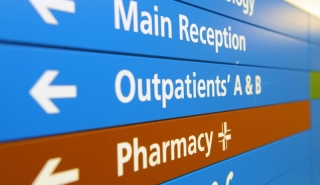More in this section:
Laboratory Medicine
Microbiology and Serology
Guidance for Test Requesting and Interpretation of Results: Click Here
Protocol for Clinical Microbiological Advice Out of Hours: Click Here
Guidance for Request form and Specimen labelling: Click Here
The Microbiology Clinical team have set up a mailbox, to be used for general correspondence, non-urgent advice and information, this mailbox will be checked regularly:
yhs-tr.clinicalmicrobiology@nhs.net
Use of the Laboratory
In these days of clinical budgeting everyone is encouraged to use the laboratory in a cost-effective manner.
The microbiology laboratory can help to:
- provide or confirm a diagnosis
- suggest appropriate antibiotics
- monitor response to treatment
Inevitably judgements will have to be made about whether to treat blind or request an investigation which may cost more than a course of antibiotics.
Failure to investigate may lead to:
- An increased use of antibiotics causing possible harm to patients
- An increasing reliance on expensive new broad spectrum agents
- Increasing antibiotic resistance in the community (and concomitant lack of knowledge of this)
- Difficulty in establishing a diagnosis when a patient has failed to respond to treatment
Laboratory Methods
Microbiology assesses the clinical relevance of investigations performed and the reliability of interpretative comments in consultation with its users through user surveys and general feedback.
New tests/services may be commissioned through discussions with the Clinical Microbiologists.
Methodology and testing is benchmarked against the UK Health Security Agency (UKHSA) national standard operating procedures, whose web-site offers valuable information on microbiological disease processes and associated microbiological investigations. https://www.gov.uk/government/collections/standards-for-microbiology-investigations-smi
Contacts for the Microbiology Service
For general result and specimen enquiries, clinical advice and key contact details for the Microbiology service: Click Here
Covid-19
For information regarding Laboratory Covid-19 testing: Click Here
For the latest Covid-19 guidance from the trust please access this from the infection prevention and control policies and procedures
Test Repertoire
Microbiology provide a comprehensive traditional bacteriology service. Please access Microbiology and Serology test information using the blue box at the top of this page.
Routine Requests
Specimens for routine investigations should be collected as early in the day as possible to ensure that they arrive in the laboratory during normal working hours.
Urgent Requests
Urgent Requests must be telephoned to alert the laboratory staff of their arrival. The request form must be clearly marked URGENT.
The Microbiology BMS on call MUST be contacted by the Switchboard Operator when ANY specimen requires urgent microbiological analysis out of normal working hours. It is the responsibility of the doctor initiating the request to ensure that all urgent and important samples are expected by the relevant Laboratory.
Add on Tests (requesting further tests on samples already received in the laboratory)
For information: Click Here
Frequency of assays
Turn Around Times
For information on expected turnaround time please access Microbiology and Serology test information using the blue box at the top of this page.
Key Factors which are known to affect the performance of Microbiology tests or interpretation of results
In general all specimens should reach the laboratory as soon as possible after being taken. Micro-organisms may be susceptible to drying, heat or cold (particularly freezing). In specimens such as sputum and urine they can multiply to inappropriate levels. Genital pathogens and anaerobic organisms are particularly sensitive to delays before culturing All bacterial swabs should be placed in Amies transport medium (refer to specific tubes as detailed in the test directory) that prevents drying, maintains pH and excludes oxygen; and kept at room temperature until delivery to the laboratory. Urine for culture should always be taken into the borate containing red-topped 30ml bottles to prevent bacterial overgrowth. Refrigerate until delivery. Specimens of clotted blood (brown top “serum” tubes) are suitable for all serological tests. Refrigerate until delivery: do NOT freeze. Blood cultures - Keep at room temperature and send the broths to the laboratory. Do not place on radiators etc as they get too hot (many pathogens cannot tolerate temperatures over 37°C).
Web page 53 last updated: 16/01/2024






